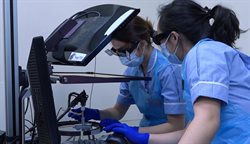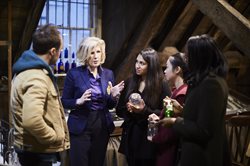 New and emerging technologies continue to change the way we educate and train dental professionals. From mobile technology, to sensors and graphic imaging, this has an impact on how students learn. It is important to understand and examine the effects of technologies on teaching and learning clinical skills. We are committed to:
New and emerging technologies continue to change the way we educate and train dental professionals. From mobile technology, to sensors and graphic imaging, this has an impact on how students learn. It is important to understand and examine the effects of technologies on teaching and learning clinical skills. We are committed to:
- Developing and evaluating simulation and virtual learning systems that enhance the teaching and learning of clinical skills;
- Examining the benefits of multimodal feedback from graphic imaging, sensors and trackers for teaching and learning and how these technologies can be exploited for dental education and practice.
- Evaluating the education impact of traditional and state-of-the-art simulations using e.g. phantom-head, digital technologies, and haptics for learning clinical skills. Haptic devices use technology based on 3D TV and the games industry, providing an immersive environment in which students can develop.
Find out more about simulation in dental education here.
 We are developing an innovative Clinical Humanities and wellbeing programme which is a first in dentistry. Currently we have a pilot programme utilising art gallery and museum space, drawing on London as a living classroom. We are linked with the Culture Institute, providing further extra-curricular activities to support wellbeing.
We are developing an innovative Clinical Humanities and wellbeing programme which is a first in dentistry. Currently we have a pilot programme utilising art gallery and museum space, drawing on London as a living classroom. We are linked with the Culture Institute, providing further extra-curricular activities to support wellbeing.
We are developing these themes because society requires clinicians who advocate against health inequalities and inequities, are innovative and caring.
The students also have opportunities to engage with vulnerable groups in the community as part of our service to society.
Tooth decay is a huge hidden burden – not often life threatening, but still the most common disease in the world with the highest burden in adults and bringing significant compromises to children’s health and wellbeing. Working with the Alliance for a Cavity Free Future and ICDAS Foundation charities, together with international partners and organisations, King’s now runs an expanding Global Collaboratory for Caries Management which is generating positive impacts in the domains of practice, postgraduate and undergraduate education, public health, policy & economics.
New scientific understandings on dental caries, its pathogenesis, aetiology, diagnosis, prevention and management have flowed from research published from the Faculty of Dentistry, Oral & Craniofacial Sciences. It is now understood that:
a) Caries is a continuum - as opposed to just end-stage cavitated disease with large holes,
b) Caries can be staged both clinically and radiographically using a ranked visual scoring system which has been validated histologically, and
c) Caries activity can be and needs to be assessed to plan optimal, personalised prevention and care.
These findings have been linked to a series of applied care options which are preventively oriented, and which seek wherever possible to minimise surgical intervention, preserve tooth structure and improve health outcomes. Policy modelling also showed that when existing data on caries prevention and control were implemented optimally in combination, a “Cavity Free Future” should be achievable.
The Advancing Dental Care national project is looking at how the dental workforce of the future will work together, and our faculty is constantly developing with a new curriculum for 2020 which will ensure the education delivered to our students meets the needs of this and the changing demographics of the population. Patients are living longer and they're retaining more teeth into later life. The challenge is how to deliver dentistry in a different way to this evolving population and our curriculum is designed to meet this need. One of the ways to meet this challenge is for hygienists and therapists to develop their scope of practise and work alongside dentists.We are building this model by developing a new hygiene and therapy degree and they'll be taught alongside the dental students.
With the massive changes in technology it's an exciting time for digital dentistry and we are actively developing and teaching digital dentistry in all of our courses. Our students have experience of CBCT, 3D scanning and milled or 3D printed restorations.
Our students study topics they probably wouldn't be able to do on many other courses. Students experience special care dentistry and conscious sedation, as well as an implantology course, with a focus on how they can use these topics in their future careers.
Finally, we're making sure the curriculum matches up with the University's wider vision. There will be stronger elements of service learning, so we'll be working with homeless charities and palliative care organisations.